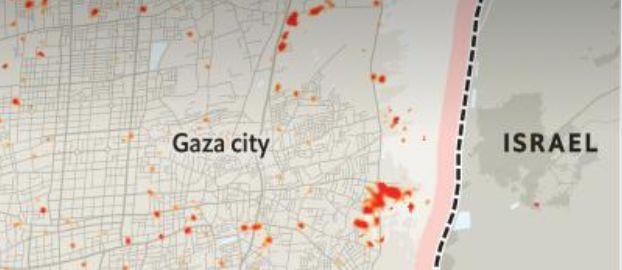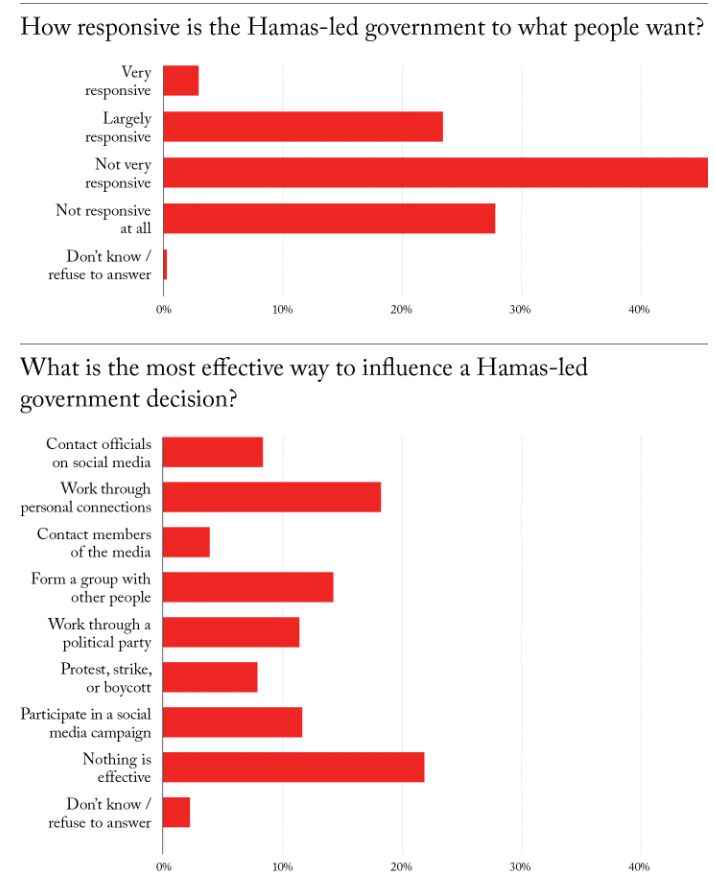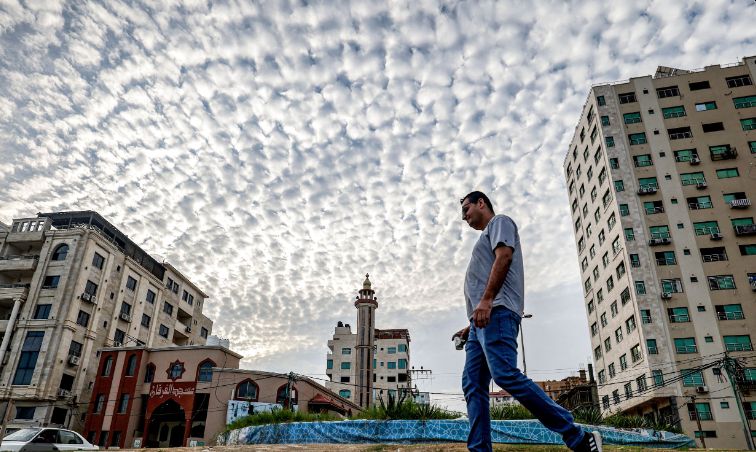By Eric Vandenbroeck and co-workers
What Gazans Think
Since Hamas’s
atrocious attacks on October 7 left more than 1,400 Israelis dead in a single
day, Israel’s response has exacted a heavy toll on the population of
Gaza. According to the Palestinian Ministry of Health, more than
6,000 Gazans have been killed and more than 17,000 injured in Israel’s aerial
bombardment. The casualties could quickly climb if Israel goes ahead with its
expected ground invasion. Israeli President Isaac Herzog, Prime
Minister Benjamin Netanyahu, Knesset member Ariel Kallner, and other
prominent officials have called for a military campaign covering the entire Gaza
territory. Israeli missiles have already destroyed around five
percent of all
buildings in Gaza, including where Palestinians sought shelter after heeding
Israeli calls to evacuate their homes. Some of Israel’s top officials, invoking
Hamas’s success in the 2006 Palestinian parliamentary elections, have, in
effect, declared that all Gazans are part of Hamas’s terrorist infrastructure
and complicit in the group’s atrocities—and are therefore legitimate targets of
Israeli retaliation.

The argument that the
entire population of Gaza can be held responsible for Hamas’s actions is
quickly discredited when one looks at the facts. Arab Barometer, a research
network where we serve as co-principal investigators, surveyed Gaza and the
West Bank days before the Israel-Hamas war broke out. The findings,
published here for the first time, reveal that rather than supporting Hamas,
most Gazans have been frustrated with the armed group’s ineffective governance
as they endure extreme economic hardship. Most Gazans do not align themselves
with Hamas’s ideology, either. Unlike Hamas, whose goal is to destroy the
Israeli state, most survey respondents favored a two-state solution with an
independent Palestine and Israel existing side by side.
Continued violence
will not bring the future most Gazans hope for any closer. Instead of stamping
out sympathy for terrorism, past Israeli crackdowns that make life more
difficult for ordinary Gazans have increased support for Hamas. If the current
military campaign in Gaza similarly affects Palestinian public opinion, it will
further set back the cause of long-term peace.
Mounting Frustration
Arab Barometer’s
survey of the West Bank and Gaza, conducted in partnership with the Palestinian Center for Policy and Survey
Research and with the
support of the National Endowment for Democracy, provides a snapshot of the views of ordinary citizens
on the eve of the latest conflict. The region's longest-running and most
comprehensive public opinion project, Arab Barometer, has run eight waves of
surveys covering 16 countries in the Middle East and North Africa since 2006.
All surveys are designed to be nationally representative; most of them
(including the latest survey in the West Bank and Gaza) are conducted in
face-to-face interviews in the respondents’ places of residence, and the
collected data is made publicly available. In each country, survey questions
measure respondents’ attitudes and values about various economic, political,
and international issues.
Our most recent
interviews were carried out between September 28 and October 8, surveying 790
respondents in the West Bank and 399 in Gaza. (Interviews in Gaza were
completed on October 6.) The survey’s findings reveal that Gazans had little
confidence in their Hamas-led government. Asked to identify the amount of trust
they had in the Hamas authorities, a plurality of respondents (44
percent) said they had no trust; “not a lot of trust” was the second most
common response, at 23 percent. Only 29 percent of Gazans expressed “a great
deal” or “quite a lot” of trust in their government. Furthermore, 72 percent
said there was a large (34 percent) or medium (38 percent) amount of corruption
in government institutions, and a minority thought the government was taking
meaningful steps to address the problem.
When asked how they
would vote if presidential elections were held in Gaza and the ballot featured
Ismail Haniyeh, the leader of Hamas, Mahmoud Abbas, the president of the
Palestinian Authority, and Marwan Barghouti, an imprisoned member of the
central committee of Fatah, the party led by Abbas, only 24 percent of
respondents said they would vote for Haniyeh. Barghouti received the largest
share of support at 32 percent and Abbas received 12 percent. Thirty percent of
respondents said they would not participate. Gazans’ opinions of the PA, which
governs the West Bank, are not much better. A slight majority (52 percent)
believe the PA burdens the Palestinian people, and 67 percent would like to see
Abbas resign. The people of Gaza are disillusioned with Hamas and the entire
Palestinian leadership.
The salience of
Gaza’s economic troubles also showed clearly in the survey results. According
to the World Bank, the poverty rate in Gaza rose from 39 percent in 2011 to 59
percent in 2021. Many Gazans have struggled to secure necessities because of
scarcity and cost. Among survey respondents, 78 percent said that food
availability was a moderate or severe problem in Gaza, whereas just five
percent said it was not a problem. A similar proportion (75 percent) reported
moderate to severe difficulty affording food even when available; only six
percent said food affordability was not a problem.
Gazan households have
felt the impact of food shortages keenly. Seventy-five percent of respondents
reported that they had run out of food and lacked the money to buy more at some
point during the previous 30 days. In a 2021 Arab Barometer survey, only 51
percent said the same. This change over just two years is alarming. Gazans have
been forced to adjust their habits to make ends meet, with 75 percent saying
they had started buying less preferred or less expensive food and 69 percent
saying they had reduced the size of their meals.
Most Gazans
attributed the lack of food to internal problems rather than to external
sanctions. Israel and Egypt have imposed a blockade on Gaza since 2005,
limiting the flow of people and goods into and out of the territory. The
strength of the blockade has varied, but it grew notably stricter after Hamas
took control of Gaza in 2007. Nevertheless, a plurality of survey respondents
(31 percent) identified government mismanagement as the primary cause of food
insecurity in Gaza, and 26 percent blamed inflation. Only 16 percent blamed
externally imposed economic sanctions. In short, Gazans were more likely to
blame their material predicament on Hamas’s leadership than on Israel’s
economic blockade. Since the time of the survey, however, this perception may have
changed. Israel cut off water, food, fuel, and electricity supplies to Gaza
following the October 7 attacks, plunging the territory into a deep
humanitarian crisis. Some international aid has entered Gaza since, but the
suffering the Palestinians have experienced has likely hardened their attitudes
in ways that could undermine long-term peace and stability.
No More Politics As Usual
Overall, the survey
responses indicate that Gazans desire political change. In an eight-point
decline since 2021, just 26 percent said the government was very (three
percent) or largely (23 percent) responsive to the needs of the people. When
asked what is the most effective way for ordinary people to influence the
government, a plurality said, “nothing is effective.” The next most popular
answer was to use personal connections to reach a government official. Most
Gazans saw no avenue for publicly expressing their grievances with the
Hamas-led government. Only 40 percent said that freedom of expression was
guaranteed to a great or moderate extent, and 68 percent believed that the
right to participate in a peaceful protest was not protected or was protected
only to a limited extent under Hamas rule.

About half of Gazans
supported democracy; 48 percent affirmed that “democracy is always preferable
to any other kind of government.” A smaller proportion of respondents (23
percent) indicated a lack of faith in any regime, agreeing with the statement,
“For people like me, it doesn’t matter what kind of government we have.” Only
26 percent agreed that “under some circumstances, a non-democratic government
can be preferable.” (This last finding is similar to poll results in the United
States, wherein, in a 2022 survey, one in five adults aged 41 or younger
agreed with the statement, “Dictatorship could be good in certain
circumstances.”)
Given the low opinion
most Gazans hold of their government, it is unsurprising that their disapproval
extends to Hamas as a political party. Just 27 percent of respondents selected
Hamas as their preferred party, slightly less than the proportion who favored
Fatah (30 percent), the party Abbas leads and governs the West Bank. Hamas’s
popularity in Gaza has also slipped, falling from 34 percent support in the
2021 survey. There is notable demographic variation in the recent responses,
too. Thirty-three percent of adults under 30 expressed support for Hamas,
compared with 23 percent of those 30 and older. And poorer Gazans were less
likely than their wealthier counterparts to support Hamas. Among those who
cannot cover their basic expenses, just 25 percent favored the party in power.
Among those who can, the figure rose to 33 percent. The fact that the people
most affected by dire economic conditions and those who remember life before
Hamas rule were more likely to reject the party underlines the limits of
Gazans’ support for Hamas’s movement.
Visions For The Future
Leadership style is
not the only thing Gazans find objectionable about Hamas. By and large, Gazans
do not share Hamas’s goal of eliminating the state of Israel. When presented
with three possible solutions to the Israeli-Palestinian conflict (as well as
an option to choose “other”), the majority of survey respondents (54 percent)
favored the two-state solution outlined in the 1993 Oslo Accords. In this
scenario, Palestine would sit alongside the state of
Israel, their borders based on the de facto boundary that existed before the 1967 Six-Day War. The level of support for this
resolution has not changed much since 2021; in that survey, 58 percent of respondents
in Gaza selected the two-state solution.
It is surprising how
little traction alternative political arrangements had gained among Gazans before
the onset of recent hostilities, given how implausible a two-state solution now
seems. The survey presented two other options: an Israeli-Palestinian
confederation—in which both states are independent but remain deeply linked and
permit the free movement of citizens—and a single state for Jews and Arabs.
These garnered 10 percent and nine percent support, respectively.
Seventy-three percent
of Gazans favored a peaceful settlement to the Israeli-Palestinian
conflict. On the eve of Hamas’s October 7 attack, just 20 percent of
Gazans favored a military solution that could destroy the state of Israel. A
clear majority (77 percent) of those who provided this response were also
supporters of Hamas, amounting to around 15 percent of the adult population. Among
the remaining respondents who favored armed action, 13 percent reported no
political affiliation.
Gazans’ views on the
normalization of relations between Arab states and Israel, meanwhile, have been
consistently negative. Only 10 percent expressed approval of this initiative in
the most recent survey—the same percentage as in 2021. Many Gazans likely
recognize that Arab solidarity is key to securing a political arrangement that
includes an independent Palestinian state. If Arab countries were to settle
their differences with Israel without resolving the Israeli-Palestinian
conflict as a precondition for normalization, any lingering hopes for a
two-state solution would evaporate.
Before Hamas attacked
Israel, Gazans’ foreign policy views suggested alignment with specific U.S.
policy priorities and mistrust of the United States. Seventy-one percent
opposed Russia’s invasion of Ukraine.
Thirty-seven percent wished for Gaza to develop stronger economic ties with the
United States—higher than the proportion that wanted to deepen economic
relations with Iran or Russia (32 percent in both cases). However, only 15
percent of Gazans believed that U.S. President Joe Biden’s policies had been
good or very good for the Arab world. And in the past few weeks, approval of
both Biden and the United States has undoubtedly declined, given the broad
perception in Gaza, the West Bank, and the region’s Arab countries that
Washington has come to the aid of Israel at the expense of Gaza.
A final finding—now
backed by countless media reports of Gazans’ anguish as escalating violence
forces them to flee their homes—is the strength of people’s connection to the
land on which they live. The vast majority of Gazans surveyed—69 percent—said
they have never considered leaving their homeland. This is a higher proportion
than Iraq, Jordan, Lebanon, Morocco, Sudan, and Tunisia residents who were
asked the same question. (The most recent available data for all these
countries comes from Arab Barometer’s 2021–22 survey wave.) Gazans face a
series of challenges, from a worsening economic crisis to an unresponsive
government and a seemingly impossible path to independent statehood. Still,
they are steadfast in their desire to remain in Gaza.
Break The Cycle
The results of the
Arab Barometer survey paint a bleak picture of Gaza in the days before the
October 7 attacks. The Hamas government, unable to address citizens’ vital
concerns, had lost the public’s confidence. Few Gazans supported Hamas’s goal
of destroying the state of Israel, which divided Gaza’s leaders and its
population over the future direction of the Israeli-Palestinian conflict. The
vast majority of Gazans strongly favored a peaceful solution, and they yearned
for leaders who could deliver it and improve their overall quality of life. So
far, however, the policies of their government and the Israeli government have
prevented progress on both fronts.
Living conditions for
Palestinians are better in the West Bank than in Gaza, but the economic and
political situation is still grim. Nearly half of the survey respondents in the
West Bank (47 percent) reported going hungry in the last month, and just 19
percent trusted the West Bank government led by Fatah—an even lower percentage
than that of Gazans who trusted Hamas’s government. Yet governance failures
have not driven West Bank Palestinians to back Hamas. When asked which party
they feel closest to, just 17 percent of respondents in the West Bank reported
support for Hamas. The amount of support for Fatah was the same as in Gaza (30
percent). Concerning individual leaders, however, the responses of West Bank
residents reflected widespread disaffection—and particular dissatisfaction with
Abbas. In a hypothetical presidential election, Barghouti was their top choice,
as he was in Gaza, at 35 percent, while only 11 percent picked Haniyeh, the
Hamas leader, and six percent chose Abbas, the incumbent leader in the West
Bank. Nearly half of respondents—47 percent—said they would not participate.

Regarding attitudes
toward the Israeli-Palestinian peace process, support for the two-state
solution in the West Bank was slightly lower than in Gaza (49 percent versus 54
percent), and opposition to Arab-Israeli normalization was slightly higher.
Only five percent of respondents in the West Bank approved of the regional
rapprochement, compared with 10 percent of Gazans. Although the differences
were small, these relatively hardened attitudes in the West Bank were likely a
result of tensions between Palestinians and Israeli settlers and soldiers in
recent months. The survey’s finding that roughly half of Palestinians still
support the two-state solution may offer some hope for peace in the long term,
but the results do not inspire much confidence in short-term stability. The
deep unpopularity of Palestinian leadership, particularly in the West Bank,
calls into question the feasibility of reestablishing the Palestinian
Authority’s control over Gaza, which some media
outlets have suggested
as the next step in reconstruction after Israel’s military campaign against
Hamas is complete.
As Israel’s
operations in Gaza escalate, the war will take an unfathomable toll on
civilians. But even if Israel were to “level Gaza,” as some hawkish politicians in the United States
have called for, it would fail to wipe out Hamas. Our research has
shown that Israeli crackdowns in Gaza often increase support and sympathy for
Hamas among ordinary Gazans. Hamas won 44.5 percent of the Palestinian vote in
parliamentary elections in 2006. Still, support for the group plummeted after a
military conflict between Hamas and Fatah in June 2007 ended in Hamas’s
takeover of Gaza. In a poll conducted by the Palestinian Center for Policy and
Survey Research in December 2007, just 24 percent of Gazans expressed favorable
attitudes toward Hamas. Over the next few years, as Israel tightened its
blockade of Gaza and ordinary Gazans felt the effects, approval of Hamas
increased, reaching about 40 percent in 2010. Israel partially eased the
blockade the same year, and Hamas’s support in Gaza leveled off before
declining to 35 percent in 2014. In periods when Israel cracks down on Gaza,
Hamas’s hardline ideology seems to hold greater appeal for Gazans. Thus, rather
than moving the Israelis and Palestinians toward a peaceful solution, Israeli
policies that inflict pain on Gaza to root out Hamas will likely perpetuate the
cycle of violence.
To break the cycle,
the Israeli government must now exercise restraint. The Hamas-led government
may be uninterested in peace, but it is empirically wrong for Israeli political
leaders to accuse all Gazans of the same. Most Gazans are open to a permanent,
peaceful solution to the Israeli-Palestinian conflict. Yet the views of the
people who live in Gaza are still often misrepresented in public discourse,
even as surveys such as Arab Barometer consistently show how different these
narratives are from reality.
In the immediate
term, Israeli and especially U.S. leaders need to secure the safety of Gazan
civilians, 1.4 million of whom have already been displaced. The United
States should partner with the United Nations to create clear humanitarian corridors
and protected zones. Washington should contribute to the UN’s appeal for $300
million in aid to protect Palestinian civilians—a step dozens of U.S.
senators have said they will support. Finally, Israel and the
United States must recognize that the Palestinian people are essential partners
in finding a lasting political settlement, not an obstacle to that worthy goal.
If the two countries seek only military solutions, they will likely drive
Gazans into the arms of Hamas, guaranteeing renewed violence in the years
ahead.
For updates click hompage here